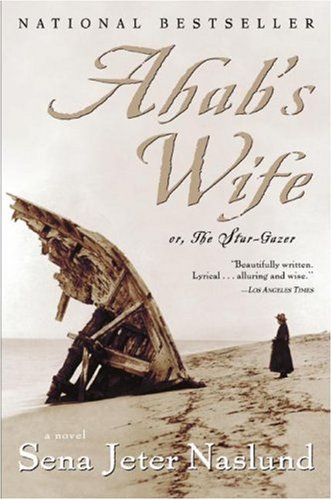Naslund, Sena Jeter. Ahab's Wife or, The Star-Gazer. New York: Harper, 1999. Print.
image from: http://d202m5krfqbpi5.cloudfront.net/books/1178657369l/817460.jpg

Una has lived quite a life.
When I began this voyage through 600+ pages, I wasn't sure I would be able to complete the book. I have found that I don't enjoy books about the water (Billy Budd, The Old Man & the Sea, Moby-Dick--ok I haven't actually read that one. I've tried multiple times, but I couldn't keep with it), so what compelled me to read this book, I do not understand.
Una seems to be telling her story as a survivor. She already knows the outcome, but the reader must hear how she survived. The opening chapters are about her losing her beloved mother and child in the same night. Then the story moves backward in time to when her mother sent Una to live on the island with her aunt and uncle. On this island is a lighthouse that she and her cousin call The Giant. This reminded me of another book (Light Between Oceans). This start to Una's narrative is explained on page 619!
Una leaves the island to meet her mother. She ends up on sailing on a whaleboat with Giles and Kit. Their voyage is heart-stopping! Una is one tough girl. I found myself caught up in the language and nuances that Naslund writes. It is a beautiful, horrifying story. So much happens that after Chapter 50, I stopped reading to begin writing this blog. I have 25 flags marking various things at this point.
I was determined to finish this book over Thanksgiving break. I did it! I am amazed at how many things Naslund ties into her book. There is the main story of Una, but there are many other characters and ideas with a place in this tale. Naslund ties in religious affiliations (Quakers, Unitarians, even Methodists). She broaches the idea of slavery (Susan has a recurring story line & Frederick Douglass speaks at an event Una attends.). She brings in women's rights and the role of women in societies. "I did not just want babies, or men who went to sea. I wanted something for myself" (Naslund 124). Una declares that she will do as she pleases, "so long as I hurt no other being" (Naslund 204). Sadly, this doesn't quite happen to Una's expectations. Oh, and then of course the life in a whaling town. Naslund also shows the human connection and what sacrifices are made for the betterment of others (See Chapter 43!).
I began mentally tracking the references to Shakespeare (King Lear & Hamlet, mostly), great classic writers like Keats, Chaucer, Swift; stories of Beowulf & Greek mythology. Una's name is "from Spenser's Faerie Queen, because [her mom] wanted [Una] to be brave and true" (Naslund 400). Transcendentalism and Emerson, Margaret Fuller and even Nathaniel Hawthorne actually makes an appearance (see page 490). Herman Melville's book is obviously present, although secondary, to this book. It was complete when Ishmael (David Pollack) is identified on page 646. Ahab appears on page 250.
Una is independent....Una is "a remarkable woman" (Naslund 191). Her story is interrupted in Chapter 57 when we hear Captain Ahab's Jottings. From here until the end, the reader gets a glimpse into other character's thoughts. At first, this bothered me. Why did Naslund spend 260 pages in Una's voice to insert others? However, after finishing the book, I understand that we needed those insights.
It takes 360 pages, but Una FINALLY becomes Ahab's wife. We had to travel that far in Una's story before she could marry Ahab. Once they are married, Una's life drastically changes. Her position in society elevates. Even with her privilege, she faces hardships. In her hardships, she befriends Susan, David Poland, the Mitchell Family, the Judge, and a neighboring artist. It is almost like this book could be two--one story of Una's life before Ahab and another story of her life after Ahab. However, that would not make her complete story. Naslund's book does. There is so much that happens that I'm not doing the book justice here.
It isn't until page 609 that Una is persuaded to write down her story (hence the narrative voice). Again, with the interruptions of other characters' thoughts, parts of the story seem a stretch. I did think it was a bit over the top to have Nathaniel Hawthorne and Frederick Douglass play a part in the story. I think that is hindsight (and poetic licensing) to let these paths cross Una's.
Some writing I liked in the book:
- "'Sometimes I like the public space,' she said. 'It's where the most private things can be said, confidentially.'" (Naslund 320).
- "'It's always that way. In learning, one thing always has something else in it, or leads to something new'" (Naslund 408).
No comments:
Post a Comment